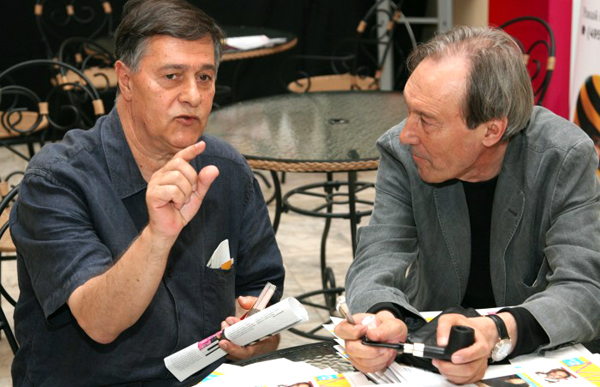On May 25, the premier of the Armenian version of the film director Samvel Saribekyan’s (Samo Spiuni) documental film “Flying Angels. Roman Balayan” was showed at the Theatre named after Henrik Malyan. The Russian version was shown earlier, in 2011, at the “Moscow” cinema. The film tells the story of Ukrainian-resident famous Armenian film director Roman Balayan’s creative years, which becomes more comprehensive and impressive through the memories and opinions of his friends, colleagues, well-known actors, and film directors. The film especially gives a great place to Balayan’s film “Flights in Dreams and in Reality”, which Samo Spiuni explained by its actuality, and by two more factors. First, when shooting his “Flying Angels. Roman Balayan” film, 30 years of the “Flights” was marked, and secondly, as said by Spiuni, Balayan has become famous by this film. “Becoming free from Soviet stereotypes, he created the character of an individual. Film Director Karen Shahnazarov says that the hero of the film is a useless person, simply a rejected because he does not agree with all that is happening around him, and expresses his fiery and unconscious protest by not so adequate behavior. There are a lot of rejected people now, and this is one of the reasons that I have devoted a large section to that film,” detailed Spiuni, in the conversation with Aravot.am, and added that the end of the “Flights” is very symbolic for him. “In the last episode, the film director is burying the staring hero in a haystack, where he curls up, accepting the position of an embryo, is crying in the feeling of his rebirth. In my opinion, this is the story of Small Meher from “Daredevils of Sassoun” when the film’s hero, entering into a haystack, closes himself like Meher was closing himself in Agravakar,” said our interlocutor. Later, the “Flying Angels. Roman Balayan” film is telling about Balayan’s other films, in short references, “Biryuk”, “Save me my talisman”, “Birds of Paradise” and so on. In the film, Balayan confesses S. Parajanov’s great influence in his creative life, “If coming to Kiev, I had not met with Parajanov, I could have become a film director, but what kind of film director. I do not know. However, faced with such a giant, I was under his influence for a long time, but my colleagues know that I’m probably the only one that was able to get free from this influence. Parajanov liked my thesis film, the “Thief,” very much, but I do not like it because it is completely Parajanov. Then I was able to slip out of this influence. My films perhaps are worse than Parajanov films but they are not Parajanov,” says R. Balayan. In S. Spiuni film, R. Balayan talks also about his decision on leaving Armenia and living in Ukraine, as well as why he does not shoot an Armenian film. “After graduating from the Institute of Theater in Kiev, I came to Yerevan to shoot my thesis, but I was refused. I had also works that I wanted to shoot, but all of them were rejected, and I returned to Kiev. And every time visiting Armenia and Artsakh, the journalists are always asking the same question whether I do not want to shoot an Armenian film. When I was already recognized, the Armenian studio was constantly suggesting me, but I was now rejecting,” tells the film director. And in the end of the film devoted to him, he speaks about the clash between the Armenian art and reality. “Why don’t Armenians and Jews take “aspirin”?, he asks, because they do not want the pain to go away, and more seriously, I want the Armenian children’s eyes be bright, bold, even impertinent; I want the traces of Genocide be disappeared from the eyes of our children. For example, when living in Armenia, I have seen how the Armenians are joking from morning till evening, telling jokes, whereas there is always grief and pathos in the art.”
Siranush HAYRAPETYAN

























































